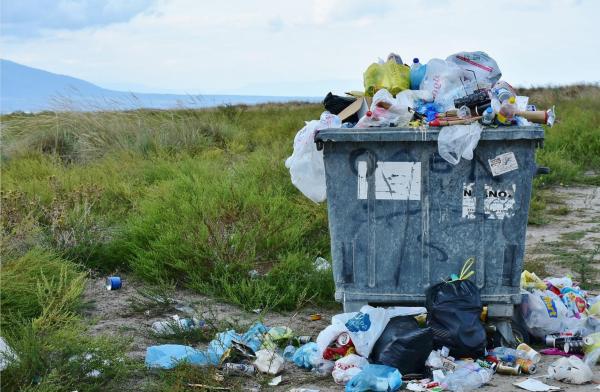Over the weekend, I took my family to the Monterey Bay Aquarium. My wife and I loved going as kids, and now that we have a young son, we were eager to watch him experience it for the first time. From leopard sharks to 40-foot-tall kelp forests, the facility showcases an impressive spectrum of marine life, and its affiliated research institute does all sorts of important and interesting oceanographic work. Plus the aquarium is situated on California's central coast, which is undoubtedly one of the most beautiful places on earth. You should go if you've never been.
Despite its praiseworthy efforts to promote ocean conservation and education, the aquarium has always had a soft spot for some of the more dubious claims advanced by environmentalists, particularly their warnings about plastic pollution. “How big is our plastic problem?” the aquarium's website asks:
From the time people started making plastic in the 1950s through 2017, we have produced more than 9 billion tons. Plastic is now commonly used in everything from packaging to clothing, building construction and electronic devices — just about anything you can think of.
That much is true, of course, but nowhere on its website nor at any exhibit does the aquarium supply the necessary context. Plastic pollution is actually declining in many places, a trend that will continue if we implement workable solutions. Though beyond urging governments to ban single-use plastic and consumers to use less of the stuff, the aquarium has little to say about solving “our plastic problem.” Let's explore the issue and its ultimate solution in a little more detail.
Oceans getting cleaner?
Consumers in the developed world are routinely told that plastic trash is the primary problem in need of a solution. This is only superficially correct, though. The ultimate issue is poverty around the world, not consumer products in the United States. According to a well-known 2017 study, the vast majority of plastic waste, more than 85 percent, comes from poor countries that lack the necessary infrastructure to properly dispose of or recycle it. They discard plastic in open-air dumps, most of which finds its way into the ocean via one of nine rivers in Africa or Asia.
More recent research indicates that “useful data on plastic debris are scarce,” largely because “data is often collected inconsistently and is reported in different units.” They nonetheless reiterated that pollution tends to correlate with poverty:
For European rivers several estimates showed annual emissions between 0.71 and 1,533 tons/year. However, most estimates range between 16 and 119 tons/year. In Southeast Asia, estimates range between 2.1·103 (2,100) tons/year for the Jakarta waterways to 1.3·103 (1,300) tons/year for the Saigon river.
The real solution
None of these facts excuse littering or the smaller amounts of plastic improperly discarded by developed countries. You are still very much a jerk if you toss your soda bottle out your car window. However, this broader context points to an important explanation for why economic growth precedes environmental clean-up efforts: you need money to reduce pollution. Plastic in the ocean is a “first-world problem” in the truest sense of the phrase.
It's the relatively wealthy proprietors and patrons of modern aquariums who have reached a living standard that allows them to focus on ocean pollution. They have the excess income that finances pollution regulation and projects to develop biodegradable plastics made from genetically engineered plants. People in emerging countries understandably have more pressing concerns, like feeding their families. Only once their populations escape poverty do most nations begin to invest resources in environmental protection.
Most estimates of future plastic pollution overlook these economic considerations. They assume a “business-as-usual” scenario in the coming decades and predict that mismanaged plastic waste will explode; one recent model indicated that the amount of waste could triple by 2060 short of "an international law-abiding agreement between countries on the management of plastic waste."
The researchers behind this estimate acknowledged that they couldn't predict “Advances in technology, consumer product design, and behavior patterns." Since those are the very pieces of data they'd need to make a reasonable forecast, a little skepticism is in order until they can build their models on more reasonable assumptions.
Plastics are quite versatile and will remain in use for a long time, thereby contributing additional pollution. But there's reason to anticipate that it will decline with time. [1] As the authors of a 2019 review put it,
… [T]he quantity and quality of plastic recycling will likely increase as technology develops. With that, waste management becomes more efficient and widely implemented over time as well, decreasing the leakage of plastics to the environment.
Putting everything together, plastic pollution is a real though fixable problem. The answer isn't drinking through paper straws, shopping with reusable grocery bags, or any other sort of moral preening typically emphasized by activists. [2] The way forward is technological development fueled by economic growth. As long as governments don't enact absurd regulations that encourage poverty, like banning the tools farmers need to grow food, the world will continue to grow wealthier and, by extension, cleaner.
[1] Plastics are enormously useful, a fact too often overlooked in this discussion. Giving up single-use grocery bags probably makes Whole Foods shoppers feel good. Will they as eagerly abandon cell phones, computers, car seats, bicycle helmets, airbags, or the dozens of other products made from plastics? Color me skeptical.
[2] Alternatives to plastic often create their own environmental externalities.




